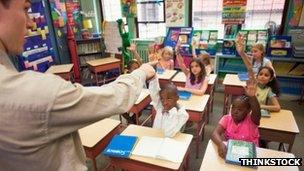Universities 'bail out' new teacher training scheme
- Published

The government wants to make teacher training less theoretical
Universities stepped in at the eleventh hour to prevent a teacher trainee shortage, the former top civil servant at the Department for Education says.
Ex-Permanent Secretary Sir David Bell said universities took more trainees in after a flagship school-based trainee scheme under-recruited.
School Direct was allocated 25% of teacher training places but recruited only two-thirds of that number.
The Department for Education said there were never formal targets.
It stressed that allocations were always over and above what is required.
However, the new figures show School Direct recruited just 68% of its allocation of 9,586 - representing 20% of the whole pool of teacher trainees in England - rather than its 25% allocation.
Whereas universities filled all but 255 of the 26,785 training places they were allocated.
Sir David, who is now vice-chancellor of the University of Reading, said: "The cracks have been papered over thanks to universities stepping in at the last minute to take on unfilled places."
'Squeezed out'
But he added that there was still a risk of shortages next year.
"We've got to ask some serious questions about schools' capacity to take on even more trainees next year, when they fell short this year".
Ministers are expected to increase the share of School Direct allocations to 37% next year.
But some universities were thinking of moving out of teacher training completely, Sir David said, "removing that potential safety net".
It was "worrying" that higher education was being "further squeezed out" next year, when there were "still risks of real shortages in key subjects", he said.
And he added that it was "perverse that university courses which have trained high-quality teachers for years" were being "choked off".
Sir David said his own university was given low allocations in core subjects this year, but then local schools were unable to fill some of their places through Schools Direct, so the university asked the DfE if it could take some extra trainees.
"It is fine to create a range of training routes but not at the expense of good, proven providers - it's tantamount to cutting off your nose to spite your own face," Sir David said.
Expert in teacher recruitment, Prof John Howson, backed up the former permanent secretary's claims saying: "Schools Direct has under-recruited pretty comprehensively and they have been bailed out by the higher education sector.
"But it it has meant that in certain subjects we have seen a downturn in the number of places filled."
This is most acute in design and technology where the places filled have fallen to 48% of the target. Computer science is also badly affected and is down to 57%.
Prof Howson said: "This is disastrous from the point of view of the new demands for children to learn computer coding from the age of five."
And he pointed out that arts subjects, such as history, had been allowed to over recruit by 143%.
"Schools Direct has not been a runaway success for training places as opposed to the general teacher programme," Prof Howson added.
His main concern was the teacher supply situation at this stage of the economic recovery, he said.
'What schools want'
A Department for Education spokesman denied that universities had stepped in to prevent a shortage.
"We do not expect to fill all places - that is why we always allocate more than we need. If the allocations are not reached it does not mean there will be a shortage of teachers.
"Together schools and universities have reached 99% of our overall target for postgraduates.
"School Direct is a response to what schools told us they wanted - a greater role in selecting and recruiting trainees with the potential to be outstanding teachers."
A Universities UK spokesman said: "With this under-recruitment via the School Direct route, universities requested to take some of the unfilled places, but often these requests were turned down."
He added that many universities have had to turn away good candidates this year. This could not make sense, he said, while School Direct places go unfilled.
"Of particular concern is the below-target recruitment in key subjects such as maths, physics and modern foreign languages."
He added that one of the issues was that while schools are closed during the summer holidays and unable to recruit more trainees, universities are still able to recruit students through their admissions departments.
Universities UK is calling for the DfE to make it easier for universities to take on unfilled School Direct places in the future.
- Published6 November 2013
- Published30 July 2013
- Published2 July 2013